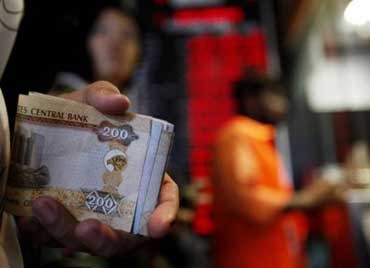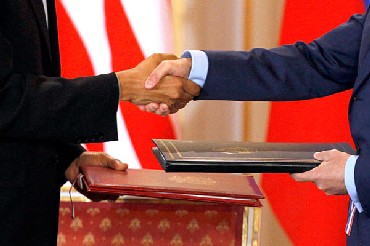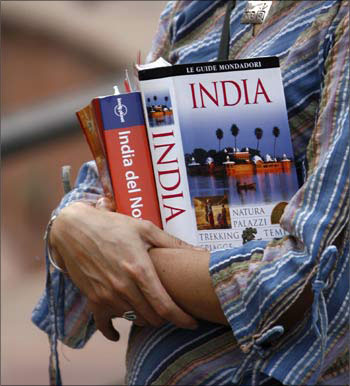 | « Back to article | Print this article |
Why India too is a TAX haven now!
It would seem when it comes to secrecy on bank accounts the Indian government seems to have a tacit arrangement with the Swiss -- even if the Swiss fail in protecting the identity of crooks, India will, says M R Venkatesh.
The story is more than three years old. Unwept and unsung, not many within our media or from the establishment have given enough attention to it.
Yet, by a strange turn of events this has come to occupy centrestage in national media and to dominate political discourse in the following weeks. In the process it threatens to bring into open India's well-kept secret.
According to an article, titled Mass Leak of Client Data Rattles Swiss Banking by David Gauthier-Villars and Deborah Ball (The Wall Street Journal, July 2010), two employees of HSBC -- Herve Falciani and Georgina Mikhael -- had sent emails more than two years ago to tax authorities across Europe.
Accordingly, they claimed that they could provide a large list of clients of a Swiss-based private bank. The emails were sent to Germany and the French investigating authorities.
Click NEXT to read on . . .
Why India too is a TAX haven now!
HSBC officials, in turn, allege that Falciani copied thousands of files of wealthy clients of its Swiss private-banking arm.
Swiss authorities are reportedly investigating whether these two employees stole bank records and violated banking secrecy laws in Switzerland.
Interestingly, the French got the data when its police raided Falciani's residence at the behest of the Swiss authorities who had, in turn, launched an investigation into the alleged violations of banking secrecy back in Switzerland.
Crucially, the French sent copies of the data to Switzerland, but kept back the original files to pursue possible tax cheats.
Click NEXT to read on . . .
Why India too is a TAX haven now!
Expectedly, the French authorities found thousands of accounts and bank-transfer details. Sifting the data, apparently the file contained data on about 79,000 clients and 20,000 companies!
The list includes more than 8,000 French, about 1,500 Americans and as many British residents.
Subsequently, the French have reportedly made available this data to governments across the world for possible pursuits of their tax cheats.
If press reports are to be believed that included Indian government too as there were allegedly several hundred Indian names in the list.
Click NEXT to read on . . .
Why India too is a TAX haven now!
Have data but no action
Much was not heard about this list till last week when the Parliamentary Standing Committee on Finance Ministry, headed by senior Bharatiya Janata Party leader and former finance minister Yashwant Sinha, raked up this issue and gave a 15-day deadline to the government to reveal the relevant names.
What is adding fat to the fire is the opinion of the Attorney General who has reportedly advised the government against making the disclosures.
The committee has also reportedly sought this opinion given by him. Well, what will happen in the next 15 days -- when the Parliament will also be in session -- is to be seen.
However, press reports suggests that finance ministry is of the opinion that any disclosure will end India's chances of getting any further lists from banks in tax havens.
Click NEXT to read on . . .
Why India too is a TAX haven now!
And this argument was used in the Lichtenstein Bank case too where similarly some employee of the bank stole its data and gave it to German authorities. And that list included Indians too.
This argument of the finance ministry, stonewalling the matter in right earnest, is extremely bizarre. After all, what the French or the German have given us is in fact stolen data.
Crucially, they have not provided anything original where the secrecy clause in Double Taxation Avoidance Agreement will operate. Put simply it will not operate when data is procured through dubious means by other governments.
So while the Indian government may be reluctant to get data from Swiss banks in the (stealthy) manner that the French or German obtained, the fact remains that governments worldwide will increasingly be procuring data by means fair and foul, and sharing with governments worldwide.
Click NEXT to read on . . .
Why India too is a TAX haven now!
Yet, it is inexplicable that we are loath to disclose the names of our tax offenders and criminals, much less take the matters to a logical conclusion.
Strangely this is the argument that has been repeatedly put forth by our government.
Remember, those who are named in these lists are no ordinary tax evaders operating in India. Let us not forget that they are extremely well connected, efficient and organised criminals.
Yashwant Sinha is spot on when he argues that black money cases were not merely instances of tax evasion. It is in this connection he reportedly pointed out, "Income tax is only the starting point of the investigation."
Click NEXT to read on . . .
Why India too is a TAX haven now!
After all, illicit money in Swiss banks could possibly mean hawala, money laundering and terror financing, involving several of our politicians, bureaucrats, members of judiciary, media, celebrities, industrialists and professionals.
Importantly money in such secret banks could be drug, terror or corruption money. Yet, till date, there is a thundering silence on such issues from the government.
India, a tax haven!
Naturally, the billion-dollar question that arises is, why is the Indian government reluctant to reveal the names of these crooks who have stashed our wealth abroad in such banks? Why are we reluctant to name, frame and shame such account holders?
It is now well accepted and understood that the details of those who have parked their wealth in Swiss banks are surely bound to come in to the open, either on account of initiatives of WikiLeaks or as the French and German governments have demonstrated above.
Click NEXT to read on . . .
Why India too is a TAX haven now!
Naturally, that makes all those who are holding secret accounts in Swiss banks extremely chary of their details spilling out into the open, with the sole exception of Indians.
After all even if the details spill out, just like the Swiss government, the Indian government too is keen to protect the identity of the holders of such accounts!
Nothing exemplified this position than the reply by the government filed through an affidavit with the Supreme Court in the black money case and is typical of how our government functions -- embellished with half-truth, half-lies and damned lies.
Stating at the outset a half-truth that the "Central Government led by Manmohan Singh, Prime Minister, played a major role in the G-20 Summit seeking exchange of information," the affidavit went on to add a half lie that it persuaded "countries which were not falling in line to review their position."
Click NEXT to read on . . .
Why India too is a TAX haven now!
It may be also be noted that never in the history of any multilateral forum has India played a major role (though it does have a role), leave alone the G-20 Summit in April 2009. But the half lie was all the more evident on the persuasion issue.
It may be noted that the turn of events since the economic crisis of 2008 persuaded most countries to go after their national wealth stashed in various tax havens. Nevertheless that did not include India!
How could a reluctant India have persuaded countries that had already decided to come to the said summit for this purpose?
Yet, the affidavit filed by the government claims the entire credit for the same! More amusement was to follow. Stating that the central government was "constantly alive to the need to be able to retrieve information about the monies which are lying deposited in foreign accounts," the affidavit filed further stated that "towards this end, initiatives have been taken on a continuous basis."
Click NEXT to read on . . .
Why India too is a TAX haven now!
If the Indian government was constantly alive to the need to track down the offenders, could not the government of India track down even one such case in the past several years and showcase it to its citizens?
If the initiatives were taken on a continuous basis, what was the outcome? The answers to these questions are obvious as it is in the Hassan Ali case -- the most notorious of them all.
Further, the affidavit states that the government has addressed the economic well being of the country at "different international fora from time to time." That the government is addressing the economic challenges of the country is in itself questionable.
That it seeks to do so in different international fora from time to time is laughable.
Click NEXT to read on . . .
Why India too is a TAX haven now!
On the issue of recovering the money allegedly belonging to Indian citizens lying in foreign banks, especially in tax havens, the affidavit of the government seeks to diffuse matters by putting forth an argument that it could possibly be legitimate accounts of Indians or Indian corporates.
In the process, it sought to completely ignore the illegitimate accounts of Indians lying in such banks. And that is the crux of the issue.
In short, the approach of our government to the vexatious issue of our illicit wealth parked in tax havens is obfuscation and stonewalling.
Naturally for all crooks, even if someone is able to gather details of their banks accounts, their safest bet would be the Indian government to protect them in their time of distress.
Click NEXT to read on . . .
Why India too is a TAX haven now!
It would seem when it comes to secrecy on bank accounts the Indian government seems to have a tacit arrangement with the Swiss -- even if the Swiss fail in protecting the identity of crooks, India will.
In the process, by design or default, our government has turned India into a functional tax haven -- where the crooks are protected by the law of the land. And for some, at-least on maintaining secrecy, India is now comparable with Switzerland!
PS: Given this track record of our own government, we want the Swiss government to reveal the names of Indian account holders. How foolish!
The author is a Chennai-based chartered accountant. He can be contacted at mrv@mrv.net.in











